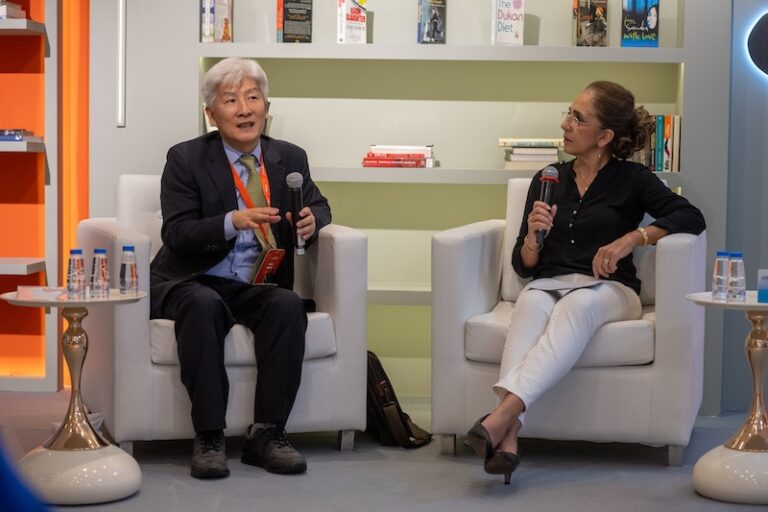“Renewable energy has increased energy independence across the world and encouraged a shift away from fossil fuels,” noted South Korean specialist in sustainable development Tae Yong Jung in his talk, “A Global Perspective on Sustainable Energy” at the 43rd Sharjah International Book Fair (SIBF), which is underway at Expo Centre Sharjah from November 6-17.
In a discussion moderated by media presenter Nadia Swan, the Professor from South Korea’s Yonsei University shed light on renewable energy approaches and how they vary significantly across countries and cultures, influenced by factors such as geography, economic development, technological advancement and cultural attitudes towards energy consumption and environmental sustainability.
A former economist with the World Bank and Asian Development Bank, Jung praised the UAE’s efforts in renewable energy production despite being an economy dependent on oil and natural gas. He referred to his involvement in the Masdar City Development in Abu Dhabi, which was modelled as a city of renewable energy. He commended the UAE leadership for thinking about a post-oil phase. Noting that the oil history is only 100 years globally and the electricity phase began only in the late 19th century while the earth has been around for 400 billion years, he felt that alternative energy sources will help to mitigate extreme weather conditions like floods and wild fires.
The author of Sustainable Development Goals in the Republic of Korea, Jung observed how Korea imports natural gas from the UAE while providing technological support for the Barakah nuclear plant. In the absence of natural resources, South Korea imports 90% of its energy requirements and has concentrated on manufacturing be it mobile phones or car batteries for electric cars.
Commenting on the barriers in the use of renewable energy, the professor noted that it is limited by weather conditions. For instance, solar energy cannot be generated after sunset or during rain or winter, he said. “Although renewable energy will play an important role in achieving the target of net zero or carbon neutral state by 2050, it cannot cover the extra demand for energy in an era when mobile phones exceed the population of countries and require electricity equivalent to that consumed by a mid-size fridge,” he observed.
Regarding the increasing use of Artificial Intelligence (AI), he said that “AI cannot think without electricity” and energy is required to keep it functioning.
Prof Jung was optimistic about using hydrogen as a future energy source and countries like UAE and Qatar which have large natural gas reserves can use technology to separate hydrogen from natural gas. He believed that the global South and large economies like India will expand greatly in the renewable energy sector.
SIBF 2024, which will run until November 17, has opened its doors to over 2,520 publishers from 112 countries, and is celebrating Morocco as the Guest of Honour. The 12-day cultural extravaganza, organised by the Sharjah Book Authority, is themed ‘It Starts with a Book’, and has in store 1,357 activities for children and adults alike.
